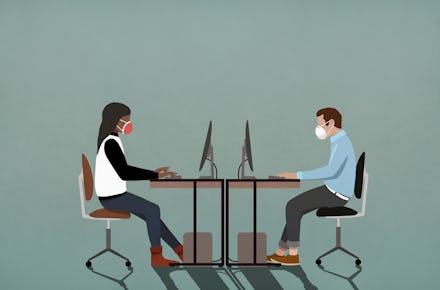These companies want coronavirus-infected employees to go home, get better, and keep it all a secret

As of this morning, there have been over 5.5 million cases of coronavirus in the United States and 180,000 people have died from the disease. Those stats make this pandemic one of the deadliest events in American history. Despite the clear and present danger that exposure to COVID-19 presents, some employers are demanding that their workers stay quiet if they test positive, despite the risk their silence may pose to coworkers.
First things first: These gag orders are not legal. Federal labor laws guarantee employees’ rights to both discuss and and resist against their working conditions. But that hasn’t stopped some money-grubbing corporations from asking employees who test positive to keep that information from their coworkers, Bloomberg reported. These very companies have even retaliated against employees when they do talk about it. Some workers at Amazon, McDonald’s, and Target were reportedly instructed to keep quiet when they tested positive for COVID-19. Basically, bosses are telling workers who contracted coronavirus to take their sick time but not to tell anyone at work why.
This is not okay, and it’s not legal either. “An employer must take employee concerns of safety seriously, including not silencing any worker that is infected with COVID-19,” says David Reischer, an NYC-based employment attorney and founder of Legal Advice, a free service that helps people get answers to their legal questions.
There are labor laws in place that protect your medical privacy. So if you test positive, your company can’t out you to others. But some companies are citing medical privacy laws in order to defend making their COVID-19 positive employees stay quiet. It’s a matter of medical confidentiality, they argued, according to Bloomberg.
To be clear, these laws exist to ensure safe working conditions, not prevent them, and while your employer can’t discuss your health with anyone, you have a legal right to tell your coworkers about anything that could make working conditions unsafe. This is a horrendous example of the ways that businesses can pervert laws meant to protect uninformed workers into a means of causing harm.
Unfortunately, many U.S. workers don’t know their rights when it comes to this virus since it’s an unprecedented situation. The rules and guidelines are changing all the time, and predatory some employers appear to be using the confusion to keep workers on the job, despite the risks posed to their health. The government isn’t helping workers much, either. The CDC recommends that employers inform workers who may have come into contact with an infected person, but so far, there is no federal mandate requiring them to do so.
Not everyone is working from home right now, and with many states reopening for business, more and more workers are in danger of infection. Because our tracing efforts have been so paltry, we can’t know exactly how many positive COVID-19 cases have come from workplace outbreaks, but some experts think that the possibility of being infected at work is a major risk. “In many places, workplace exposures are driving the pandemic,” David Michaels, epidemiologist, former head of OSHA, and professor at George Washington University, told Bloomberg. “To stop this pandemic, workers need to be listened to rather than silenced.”
Which shady conglomerates are potentially guilty of this? Too many to name. The list of companies includes some unsurprising behemoths like Walmart and Halliburton, but also seemingly less likely offenders like Warby Parker and Urban Outfitters (most of these companies disputed the allegations), according to Bloomberg.
As of the beginning of August, the Occupational Safety and Health Administration (OSHA), which investigates worker safety complaints, had already investigated over 600 COVID-19-19 whistleblower complaints. Fingers crossed that these at-risk workers get the protection they deserve.